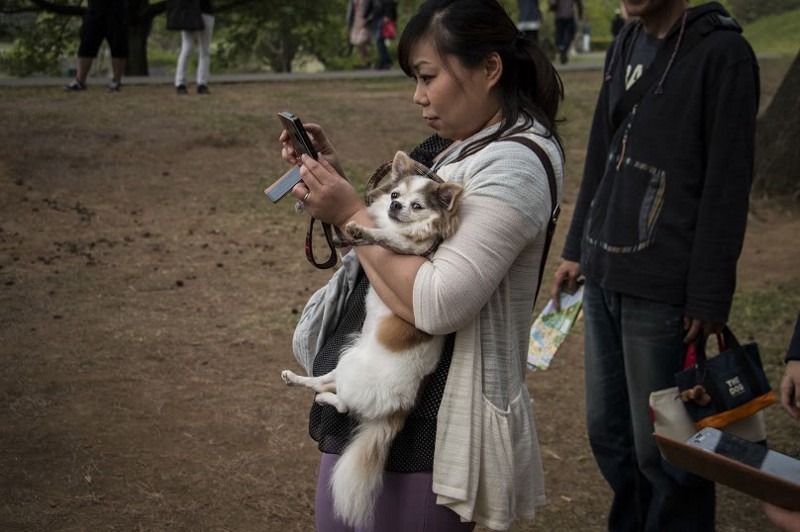Japan’s population crisis is well documented. In a country with the highest life expectancy in the world and one of the lowest birth rates, one could expect some good business opportunities in the aged care area.
However, when reading there is actually a nursing home for dogs in Tochigi and analysts are beginning to turn their attention to a graying canine population, it highlights the unique demographics and consumer demands of this aging nation.
As Japanese women become increasingly empowered in society and the workplace, their focus inevitably shifts from the family to themselves. Furthermore, with growing constraints on time and space in Japan’s big cities, have dogs (in particular miniature and toy dogs) become an ideal substitute for children? Lower maintenance and cheaper to raise, with less restrictive impacts on a young couple’s lifestyle, a pampered Pomeranian offers both companionship and a release for cravings for cuteness.
Today in Tokyo, the calls of ‘kawaii!’ (cute) from office ladies cooing over a pushchair or pram are now increasingly likely to be aimed at a French bulldog, rather than a bouncing new baby. With recent population figures for Japan reporting that there are now more dogs than children under ten this shows little sign of easing off soon.
Whilst this trend does not ease the fears of a population crisis and it may raise concerns for any business wishing to enter what can be considered a mature market, it does mean greater disposable incomes for adults of child-rearing age. And as these emerging ‘dog parents’ have more disposable income with which to indulge themselves, more money is also being spent indulging their dogs. Pet-pampering is big business.
According to statistics by Yano Keizai Kenkyujo, pet related industry sales in 2011 saw a 9% increase, selling 1.39 trillion yen, over 1.27 trillion 2006. Further, the pet industry is predicted to grow in coming years, with spending on pets increasing by 1.7 times in the past 15 years, according to the Ministry of Internal Affairs and Communications.
The $800 a month nursing home mentioned before is really just the beginning (or should that be ‘end’). A walk around any of Tokyo’s more affluent suburbs will take you past dog hotels, massage parlours, aromatherapy suites, oxygen bars and bespoke tailors, as well as the ubiquitous dog hair-salon.
According to the website dogcafe.com, there are over 831 dog cafes, 1709 pet trimming salons, and 1396 pet-hotels throughout Japan, just counting those that are registered on their website. Setagaya-ku has over 35 cafes where dogs and their “moms and pops” of dogs (as they like to call themselves) can go and enjoy a meal.
Dubbed the ‘Doggy Street’ or ‘Mecca of doggies’, Tokyo’s Komazawa Park street alongside Komazawa Olympic Park is full of dog-friendly cafes and shops and even has a “dog-run”, which is a field in which you can let your dog run freely. Even if there is no special menu for the doggies, most establishments will welcome them and give them water.
Multipurpose service establishments aimed at pets and their owners are beginning to pop up. Andy Café, near Setagaya Park in Tokyo, is not just another café where dogs can accompany their masters, but also offers a dog hotel, dog salon, a dog run and a kindergarten for dogs, where they can be toilet trained.
The dog’s menus at these dog cafés are nothing short of elaborate. At Andy Café, the dog menu ranges from five different types of ‘birthday cakes’ decorated using whipped soy cream to ‘wan-burgs’ (a take on hamburger), meatloaf, croquettes, fried rice, cheese cake, tomato gazpacho; and for those in need of a diet, a ‘healthy plate’ consisting of mainly vegetables. The café also does home-delivery, perfect for when you need to throw a birthday party for your pooch.
Despite the picture painted of younger people opting for pets instead of children, according to a survey by Japan Petfood Association, it is actually people in their 50s who were the ones most likely to have a pet, with up to 22.9% owning a dog and 12.7% owning a cat.
It seems that those who are heading into retirement with high disposable income, and no need to take care of their grown children are seeking the company of pets. Perhaps these would-be-grandparents are as likely to be splurging on their pets as they are on their grandchildren.
And for anyone about to question the sense of how much is being spent, well, how can you put a price on family?
21st April 2012
CarterJMRN is a strategic market research agency that has been helping clients with consumers and businesses in Japan and beyond since 1989.
We believe that, although the terrain you face in building a successful marketing strategy and activation path sometimes seems obscure, the path to success is knowable and that the consumer is the guide who will show you the way.
Find out more and get in touch on our site

